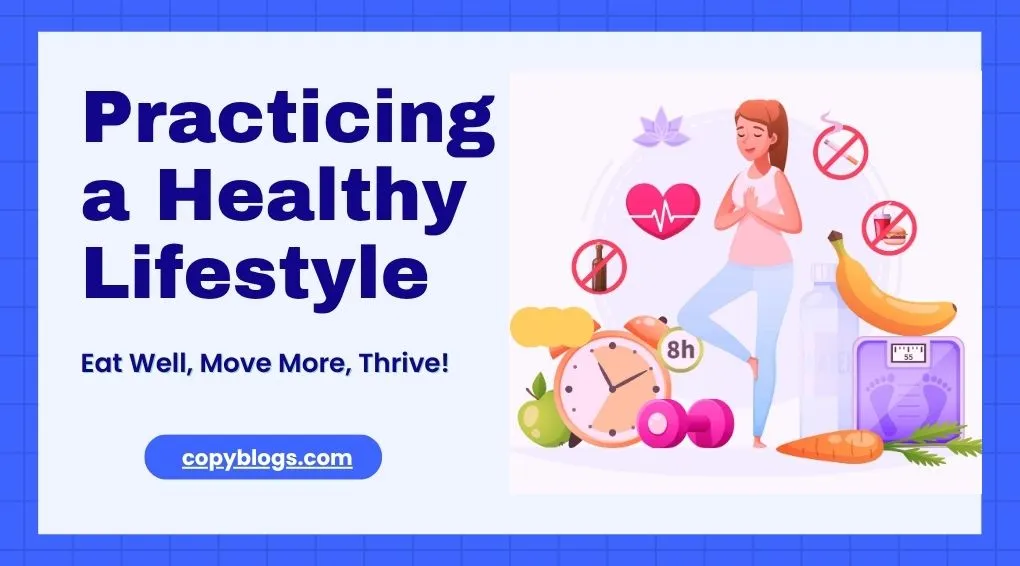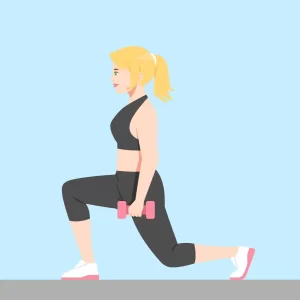
How to Maintain a Healthy Lifestyle: Balanced Diet, Exercise & Wellness Tips
- June 12, 2025
- by
- Shanaya
How to maintain a healthy lifestyle and balanced diet?
The journey starts with informed daily choices. A healthy lifestyle combines a balanced diet, regular physical activity, stress management, and proper sleep and hydration habits to boost energy, mood, and overall well-being.
What Is a Healthy Lifestyle?
A healthy lifestyle is characterized by continually maintaining specific actions that keep one well and functioning at their best.
Adopting healthy eating, regular exercise, sufficient relaxation, staying hydrated, and caring for one’s mind all strengthen and optimize wellness. Such straightforward routines mitigate chronic diseases like diabetes and heart disease.
This approach falls under lifestyle medicine, where daily choices like diet and activity levels serve to prevent and treat disease. Feeling more energetic, thinking more clearly, and even living a longer life are benefits of adopting a healthy lifestyle.
Benefits of a Healthy Lifestyle
A healthy lifestyle offers numerous benefits:
- Support heart, brain, and digestive health
- Help manage weight and blood sugar levels
- Strengthen immunity
- Improve mood, sleep, and mental focus
- Lower risk of chronic diseases
You don’t need to achieve health all at once. It is a long-term journey, and should be approached gradually to form lasting and positive healthy habits for your daily routines.
Healthy Lifestyle Checklist
A daily healthy lifestyle checklist includes:
- Nutritious food: Eat from a balanced plate.
- Physical activity: Move your body for at least 30 minutes.
- Sleep and hydration tips: Establish a healthy routine for 7 to 9 hours of sleep, and drink more water.
- Reduce stress naturally: Breathe, journal, take breaks.
- Avoid harmful habits: Quit smoking, limit alcohol and sugar.
- Active living: Walk, stretch and stand frequently.
- Meal plan: For at home or dining out.
- Portion control for weight loss.
- Track progress with apps or pen and paper.
How to Eat a Balanced Diet
What to Include
Maintaining a balanced diet will ensure that your body gets all the necessary nutrients to help it function properly.
Nourishing the body includes carbohydrates, proteins, fats, fibers, vitamins, and minerals.
A simple way to improve eating habits is using the balanced meal plate.
- ½ plate: fruits and vegetables
- ¼ plate: whole grains (carbohydrates)
- ¼ plate: protein
Add a small portion of healthy fats paired with a dairy or plant-based alternative to complete the meal.
Tips for Planning a Balanced Diet
- Proteins: eggs, fish, chicken, tofu, legumes, nuts
- Whole grains: brown rice, oats, quinoa, whole wheat bread
- Fats: olive oil, avocado, seeds, nuts
- Fruits & vegetables: colorful variety for antioxidants, fiber, and vitamins
- Dairy or alternatives: yogurt, milk, fortified plant-based options
Summary:
To get all the essential vitamins, minerals, and antioxidants, eat foods from different categories.
Healthy Eating Tips for Beginners
If you’re just starting out, try these easy steps:
- Have a healthy breakfast: Try oats with a banana or toast topped with egg.
- Increase the amount of vegetables in the meals.
- Opt for fiber-rich foods like brown rice and beans.
- Drink water instead of soda.
- Increase cooking at home.
- Limit alcohol consumption.
These tips for balanced nutrition help improve gut health, metabolism, and emotional well-being.
Meal Planning for a Balanced Diet
A balanced diet is easy to follow with basic planning and good food swaps. Planning meals saves time while promoting a healthy lifestyle. Check out these ideas:
- Plan meals for the week.
- Focus on whole foods with your grocery list.
- Pre-chop vegetables.
- Prepare large quantities of grains or soups.
- Make healthy snacks: boiled eggs, yogurt, fruit, nuts, and vegetables.
Healthy balanced diet snacks include:
- Peanut butter and apple slices
- Greek yogurt and berries
- Carrots and hummus
- Roasted chickpeas
Physical Activity for Better Health
Exercise plays a key role in a healthy life. It aids in weight loss, heart health, good mood and sleep. The WHO suggests doing 150 minutes of moderate exercise per week.
 Simple ways to be more active:
Simple ways to be more active:
- Walk on a treadmill or go for a 10–30 minute walk.
- Keep heart strong with fun physical activity like dancing, biking, or a fast walk.
- Do strength exercises twice a week to make muscles stronger.
- Try yoga to stretch your body, feel lighter, and become more flexible.
- Use things at home for exercise: lift water bottles, or walk up and down the stairs.
Physical activity and balanced diet help boost fitness and overall health.
Sleep and Hydration Tips for Daily Wellness
Improve Sleep Quality
 Getting enough rest helps your body heal and your mind stay sharp. Try these easy tips:
Getting enough rest helps your body heal and your mind stay sharp. Try these easy tips:
- Go to bed and wake up at the same time every day.
- Turn off phones, tablets, and TVs an hour before bed.
- Make room dark and quiet.
- Skip coffee, tea, or big meals before sleeping.
- Read a book or stretch the body to relax.
Sleep affects everything, from immune system to mood and weight. Thus, good sleep should be part of a healthy lifestyle.
Drink More Water
 Water helps the body work well and stay in balance. It can:
Water helps the body work well and stay in balance. It can:
- Make digestion easier.
- Boost energy and keep skin healthy.
- Reduce food intake by making you feel full.
Tips to stay hydrated:
- Aim for 6 to 8 glasses of water each day.
- Add lemon, mint, or cucumber for a tasty twist.
- Try to skip sugary drinks like soda or sweet juices.
Limit Alcohol
New report revealed on European Brain Council stated that drinking less alcohol leads to better physical and mental health.
 It can:
It can:
- Keep brain healthy
- Support a strong heart
- Help with managing weight
- Lower the risk of liver problems and cancer
- Improve sleep
- Protect reproductive health
- Reduce the chance of addiction
- Boost mood and clear thinking
- Increase longevity
Even small reductions in consumption can have significant positive effects, contributing to an overall better quality of life.
To stay healthy, try to limit alcohol to 1–2 drinks a day.
Stress Management
Natural Stress Management Techniques
 Too much stress over time can quietly harm the body, mind, and happiness. Managing it naturally helps you feel better and stay healthy long term.
Too much stress over time can quietly harm the body, mind, and happiness. Managing it naturally helps you feel better and stay healthy long term.
Easy ways to lower stress:
- Try deep breathing (inhale for 4 seconds, exhale for 6 seconds)
- Walk outside or around home.
- Write in a gratitude or reflection journal.
- Practice meditation or gentle yoga.
- Talk to someone you care about.
- Listen to calming music.
Support Stress Relief with Food
What you eat also affects how you handle stress (Source). Some foods support stress management by calming the nervous system.
Try adding these to regular meals:
- Foods with magnesium like spinach and nuts.
- Omega-3 rich foods such as salmon or flaxseeds.
- Herbal teas including chamomile or peppermint.
Avoid Harmful Habits
Healthy living means cutting down on things that hurt the body:
- Quit smoking. It lowers the risk of cancer and heart problems.
- Eat fewer processed foods. Try to reduce salt, sugar, and unhealthy fats.
- Cut back on sugary treats. Choose fresh fruit or plain yogurt instead.
- Skip extreme diets. But focus on balance, not strict rules.
- Move more during the day. Don’t sit too long; take breaks to stretch or walk.
Tips for Eating Out & Emotional Eating
An individual can still eat out and stay healthy. Try these simple tips:
- Pick grilled foods instead of fried.
- Skip sugary drinks like soda.
- Ask for sauces and dressings on the side.
- Eat smaller portions to help with weight control.
If you eat when you’re feeling emotional:
- Write down what you eat and how you feel.
- Find comfort in hobbies, music, or light activity.
- Pause and check in with yourself before eating.
Simple Diet Tips for Health & Weight Loss
You don’t need a strict diet, just aim for:
- Eating a mix of fresh, whole foods.
- Controlling portion sizes.
Easy meal planning ideas for weight loss
- Build meals with protein, fiber, and healthy fats.
- Try a few plant-based dishes each week for variety and balance.
FAQs About Healthy Living
What are the mental health benefits of a balanced diet?
- It supports brain function, reduces anxiety, and boosts mood naturally.
What is a nutritional habit?
- A way of eating that includes all food groups in proper amounts—grains, proteins, fruits, vegetables, healthy fats, and dairy.
How to eat a healthy meal daily?
- Use the meal plate method, eat fresh and whole foods, and drink enough water.
Which dairy alternatives work well in a whole food diet?
- Almond milk, oat milk, soy milk, and coconut yogurt with added calcium and B12.
What is lifestyle medicine?
- A science-based approach where healthy habits like eating right, moving more, and sleeping well help prevent or treat health issues.
What are gut-friendly foods?
- Yogurt, kefir, whole grains, bananas, and fiber-rich vegetables.
Conclusion: Start Your Healthy Lifestyle Today
Adopting a healthy lifestyle is a process. With the proper focus, it can yield positive results. Focus on balanced eating, fitness, and simple sleep and hydration tips to improve daily health.
Start small with these tips—eat well, move more, and rest deeply—to enjoy better health and happiness. By following these tips, anyone can enjoy the long-term benefits of a healthy lifestyle.
More references:









